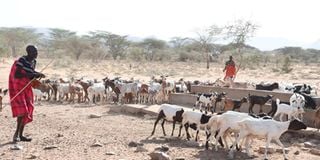Premium
Igad protocol to help Turkana promote viable pastoralism

A herder from Kakon’gu in Turkana South with his sheep and goats at a watering point. Turkana has adopted a protocol which is expected to promote and sustain pastoralism along the border.
The county government of Turkana has adopted a protocol which is expected to promote and sustain pastoralism along the border, as well as address conflicts over pasture and water.
The protocol titled ‘The Karamoja Transhumance Corridor Development Plan’ was developed by the Intergovernmental Authority on Development (Igad) on transhumance along the border of Kenya and Uganda.
Transhumance refers to the practice of moving livestock from one grazing ground to another in a seasonal cycle, typically to lowlands during the cold season and to highlands in hot seasons.
Although they have not been officially documented, seasonal livestock migration routes have existed for hundreds or even thousands of years as a survival strategy for pastoralists.
According to the county Pastoral Economy Executive George Emoru, weather at the border region which has a large number of livestock is unpredictable, forcing pastoralists to frequently migrate, either forcefully or through organised local structures.
The adoption of the protocol is expected to facilitate safe and regulated livestock cross-border mobility in the region.
Resources mapped
"The available resources within the migratory routes have been mapped and guidelines have been provided to relevant stakeholders on how to promote and enhance the livelihoods of local communities and mobile pastoral population through investment on more watering points, grazing zones and accessibility to social amenities," the county official said.
Mr Emoru revealed that Turkana County will take advantage of the protocol to establish prioritised water infrastructure as well as invest in animal and human health.
Igad hopes that the adoption of the protocol by communities will enable easy, free and safe movement of pastoralists across borders of countries in the region in search of water and pasture.
IGAD Cross Border Development Facilitator Dominic Lokeris said that lack of an arrangement where pastoral communities can easily cross borders in search of water and pasture for their cattle normally leads to conflicts over such resources.
“We are banking on the protocol to allow for peaceful co-existence that can assure governments and development partners of a conducive environment to initiate development activities," said Dr Lokeris.
Pastoralists he added, should be made aware of where to get water and pasture for their livestock that are at risk of dying due to starvation, disease and drought.





